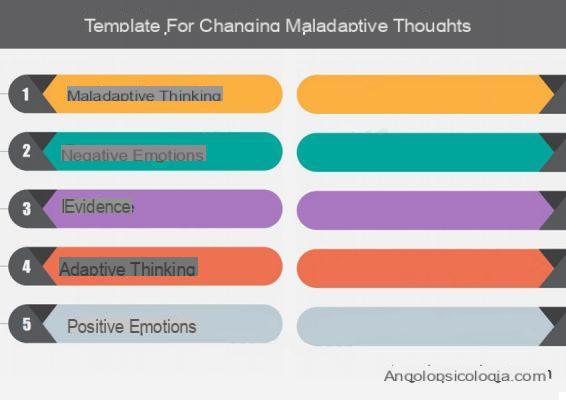
Empathy is one of the most popular concepts in psychology, but self-empathy is a virtually unknown and often underestimated skill, despite its importance to our psychological well-being. We know that being empathic opens many doors for us because it allows us to establish interpersonal relationships based on trust and understanding.
However, empathy is essentially an external quality. It is putting yourself in someone else's shoes to understand their points of view and experience their emotions. Self-empathy, on the other hand, is directed inward. It allows us to give ourselves that much-needed hug when things go wrong.
What exactly is autoempathy?
Self-empathy is a psychological skill that allows us to notice and recognize what is happening inside us. It allows us to grasp and understand our thoughts, emotions and impulses.
Therefore, self-empathy involves a deep and personal exploration of what is happening in our inner world. It is the self that observes itself empathetically. This means that we open up to our inner experiences without judging them, as we would with a friend.
Self-empathy is the key to feeling good in our skin
One of the reasons we are reluctant to practice self-empathy is because we mistake it for self-compassion and perceive it more as a euphemism for complacency. This causes us to refuse and treat ourselves with excessive harshness.
However, while self-compassion involves treating ourselves with the same kindness, concern, and support that we would give a good friend, empathy for oneself goes a step further by suppressing judgment. Unlike complacency, which can become a destructive force, self-empathy generates a higher level of self-knowledge, sensitivity to one's suffering, and a greater personal commitment to finding useful solutions to problems that affect us.
In fact, numerous studies indicate that self-empathic people are less prone to laziness than those who are overly critical of themselves, as well as being more resilient, motivated, satisfied with life and empathetic towards others. Conversely, highly critical people tend to be more hostile, feel less satisfied with their life, and are more prone to anxiety and depression.
Self-empathy, therefore, involves recognizing that, like everyone else, we deserve understanding and compassion. This will not prevent us from demanding the best of ourselves, but it will prevent us from complaining and unfairly punishing ourselves when we cannot achieve it. In a sense, self-empathy balances the parameters we use with ourselves and with others.
When we are self-empathetic, we understand that whatever mistakes we have made, we deserve a second chance. We focus the understanding we normally give to others towards ourselves so that we don't get stuck in the quagmire of our judgments and recriminations.
This does not mean that we believe we are superior, that we think we deserve more than others or that we apologize for our mistakes, just that we treat ourselves more kindly as we try to improve and grow.
Self-empathy does not relieve us of our responsibilities or the need to apologize when we are wrong, it simply means that, like everyone else, we deserve to treat each other with love, compassion, understanding and empathy. This ability helps us feel good and make peace with ourselves as we strive to become the person we want to be.
How to develop self-empathy?
To develop self-empathy, we must first be fully aware of its importance. We know that empathy is an essential ingredient in maintaining good interpersonal relationships, but it is not something we normally reflect internally. We urgently need to change this belief.
We can think of the kindness and understanding we dedicate to ourselves as the equivalent of an oxygen mask on an airplane. Before offering empathy and compassion to others, we must put on the mask and breathe in oxygen ourselves.
To help others, we must first help ourselves, as revealed by a study conducted at Harvard University in which it was found that when we are emotionally overloaded, we criticize ourselves excessively and psychologically exhaust ourselves, our empathic capacity towards others also decreases. others.
1. Talk to ourselves as we would talk to a friend
The first rule of developing empathy for yourself is: don't tell yourself what you wouldn't tell your best friend. Changing the way we approach ourselves will allow us to treat ourselves with greater kindness. We cannot feel compassion for ourselves if we constantly berate ourselves and spend much of the day throwing poison darts at our self-esteem.
A simple exercise to change the inner dialogue is to draw a graph with two columns and five rows on a piece of paper, like the one below.

In the line "Maladaptive thinking" we have to write the idea with which we punish ourselves, such as: "I am good for nothing". So we need to focus on the emotions that emanate from that thought and write them in the "Negative emotions" box. In the "Evidence" box we must write anything that questions that thought and demonstrates that it is not 100% true. Often this means looking back to the past.
In the line "Adaptive thinking" we will have to replace the original idea with one that fits better with reality, such as: "I will recover from this failure" or "I will learn from the mistakes made to do better next time".
Finally, in the line "Positive emotions" we must write how this new thought makes us feel, focusing on pleasant emotions. We must repeat this exercise with the different thoughts and ideas that we usually use to punish ourselves, until the process of replacing with a more objective and rational one becomes automatic.
2. Accept emotions
Self-empathy involves immersing ourselves in our feelings and emotions. But sometimes, when we get in touch with our inner world, we find things we don't like. We may notice, for example, that more anger and contempt is simmering within us than is “socially acceptable”. Then the impulse arises to get away from ourselves to avoid those feelings. But we must do the exact opposite: accept the shadows we have inside.
Experiencing empathy towards ourselves implies accepting ourselves as we are in that precise moment. To do this we must learn to immerse ourselves within ourselves with an uncritical gaze, aware that, in addition to the negative inner dialogue, also the judgments we issue towards ourselves hurt us and condemn us to a vicious circle of recriminations and faults that ends up tearing our potential making us feel bad.
Transcendental Meditation is a great exercise for learning to identify our thoughts and feelings without reacting to or judging them. In fact, the systematic practice of full attention helps us to better regulate our emotions and allows us to accept our "I".
To get to that level, we need to change our mindset and understand that emotions are neither good nor bad. Fighting them only serves to highlight and strengthen them in our mind. Instead we must learn to accept them, acknowledge their presence and let them go, without grasping for them. When we learn not to judge our feelings we become more empathetic with ourselves.
3. Forgive us and treat us with kindness
Being kind to ourselves is an essential aspect of self-empathy. Kindness towards ourselves implies being understanding and forgiving ourselves when we make mistakes, avoiding becoming too harsh and uncompromising judges with ourselves. In this way we avoid that the mistakes of the past accumulate in the weight of guilt and doubt to the point of destroying our self-esteem and self-confidence.
Unfortunately, forgiving our mistakes can be much more difficult than forgiving someone who has hurt us. But we can't develop self-empathy without learning to move on. Forgiving ourselves does not mean justifying ourselves or pretending that what we did was not wrong; it just means showing compassion for ourselves and recognizing our humanity.
To forgive ourselves, it is useful to always remember that, in life, we have done our best with the tools and knowledge we had at the time. Judging ourselves in the light of the future is not fair to ourselves.
We must keep in mind that our experiences, the environment in which we made the decision or even our mental balance at that moment influenced the path we took. If our parents haven't taught us how to manage anger, we are unlikely to know how to express it in a healthy way. If we work in a very competitive and ruthless environment, we will probably have taken advantage of someone.
These are no excuses for misbehaving, much less for not trying to change, but taking into account our past and context will help us treat ourselves more kindly and make peace with ourselves. This will allow us to learn from our mistakes so that we don't repeat them. But most importantly, it will allow us to become our best friends when we need it most.


























